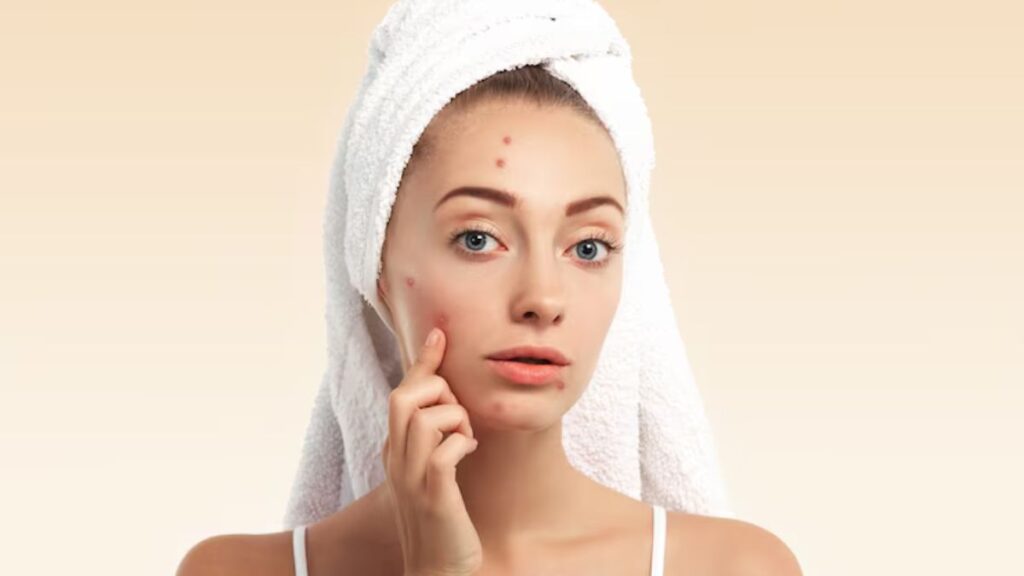What Is Hyaluronic Acid?
Hyaluronic acid (HA) is a naturally occurring substance in the human body, most abundantly found in the skin, connective tissues, and eyes. Its primary function is to retain water to keep your tissues well-lubricated and moist. In the skincare world, HA is celebrated for its unmatched ability to hydrate the skin and make it appear plump and youthful.
Hyaluronic acid can hold up to 1,000 times its weight in water, making it one of the most effective moisturizing agents available. It’s commonly found in serums, creams, moisturizers, and even injectable fillers. This humectant draws moisture from the environment into the skin, improving its texture and elasticity.
Given its reputation as a hydrating powerhouse, it may seem surprising to question if hyaluronic acid can cause acne. But like many skincare ingredients, results can vary from person to person.
How Hyaluronic Acid Works on the Skin
To understand whether hyaluronic acid can cause acne, it’s essential to grasp how it interacts with the skin. HA is not an oil-based or comedogenic substance. It is lightweight, non-irritating, and generally safe for all skin types—including oily and acne-prone skin.
When applied topically, HA binds water molecules to the skin’s surface, increasing hydration levels. Well-hydrated skin can help balance oil production, reduce the appearance of fine lines, and strengthen the skin barrier.
However, the performance of HA depends on multiple factors like:
-
The product’s concentration
-
Additional ingredients in the formula
-
The surrounding environment (e.g., humidity levels)
-
Your skin type and sensitivity
So, while HA itself may not directly cause acne, its effects can be influenced by how and where it’s used.
Can Hyaluronic Acid Cause Acne?
The short answer is: hyaluronic acid doesn’t typically cause acne, but in certain situations, it might contribute to breakouts indirectly.
Here’s how:
Low-Quality Formulations
Some HA products include added fragrances, preservatives, alcohols, or pore-clogging ingredients. These additions—not hyaluronic acid itself—can trigger acne in sensitive individuals. Always read the ingredient list and choose reputable brands.
Over-Moisturizing the Skin
When too much hydration is introduced without proper exfoliation, dead skin cells can build up, creating a breeding ground for bacteria. This buildup can trap sebum and debris in the pores, leading to acne breakouts.
Improper Application
Applying HA to dry skin without sealing it with a moisturizer can draw water from the deeper layers of your skin instead of pulling it from the air. This can leave the skin dehydrated and lead to increased oil production, which may clog pores and result in breakouts.
Skin Purging
Some users report experiencing “purging” when they first incorporate HA into their routine. This happens when your skin accelerates cell turnover, temporarily bringing pre-existing acne to the surface faster. While this isn’t new acne, it can be mistaken for a breakout caused by the product.
Reaction to Multiple New Products
If you start using HA alongside several new skincare items, it becomes difficult to isolate which one is the culprit. Introducing one product at a time helps determine what works for your skin.
Curious to learn more? Dive into the rest of our blog for helpful tips and insights!
Who Is Most Likely to Experience Acne from Hyaluronic Acid?
While rare, some people may notice breakouts when using HA-based products. Individuals more prone to this include:
-
Those with extremely oily skin
-
People with compromised skin barriers
-
Users layering HA with comedogenic products
-
Those living in dry climates without a sealing moisturizer
Understanding your unique skin type and conditions will help you use hyaluronic acid more effectively and avoid possible negative reactions.
How to Use Hyaluronic Acid Without Causing Acne
To get the best results from hyaluronic acid while minimizing the risk of breakouts, follow these expert tips:
Choose the Right Product
Select pure hyaluronic acid serums without added oils, fragrances, or harsh chemicals. Products labeled “non-comedogenic” are less likely to clog your pores.
Apply to Damp Skin
Always apply HA to freshly cleansed, damp skin to allow the ingredient to draw moisture from the environment, not your skin’s deeper layers.
Follow With a Moisturizer
Seal in the hydration with a good moisturizer immediately after applying HA. This prevents moisture from evaporating and helps keep the skin barrier strong.
Don’t Overuse It
Stick to using HA once or twice a day. Excessive use may overwhelm your skin or mix poorly with other products in your routine.
Patch Test New Products
Before applying any new HA product to your face, do a patch test on a small area of your skin to rule out potential irritation or allergic reaction.
Did you find this article helpful? Check out the rest of our site for more great content!
Alternatives to Hyaluronic Acid for Acne-Prone Skin
If you’ve tried HA and suspect it’s worsening your acne, you may want to explore other hydrating ingredients that are acne-safe:
-
Glycerin: A gentle humectant that attracts water without clogging pores.
-
Aloe Vera: Soothes inflammation while providing light hydration.
-
Niacinamide: Balances oil production and strengthens the skin barrier.
-
Squalane: A non-comedogenic oil that mimics the skin’s natural sebum.
-
Ceramides: Help repair the skin barrier and retain moisture.
These ingredients can deliver similar benefits without the risk of exacerbating acne for sensitive individuals.
When to Stop Using Hyaluronic Acid
Discontinue use if you notice:
-
Persistent breakouts in areas where the product is applied
-
Itchiness, redness, or a burning sensation
-
Your skin feeling tighter or drier after application
Switch to gentler, simpler hydration methods and consult with a dermatologist if symptoms persist. Your skin may need a different type of care or a personalized routine.
Conclusion
Hyaluronic acid is widely regarded as a safe and beneficial skincare ingredient, especially for hydration. On its own, it does not cause acne. However, when combined with low-quality formulations, improper application, or certain environmental factors, it might contribute to breakouts—especially in sensitive or acne-prone individuals.
The key is to choose high-quality, non-comedogenic HA products, apply them correctly, and monitor your skin’s response. Hydration is vital for healthy skin, but overdoing it or misapplying even the best ingredients can have unwanted effects.
As with any skincare product, what works for one person might not work for another. Listen to your skin, and don’t hesitate to consult a professional if you’re unsure.
FAQs
Can hyaluronic acid clog pores?
No, hyaluronic acid is non-comedogenic and does not clog pores. Breakouts are usually due to other ingredients in the formulation.
Is hyaluronic acid good for acne-prone skin?
Yes, when used correctly, it hydrates without adding oil, helping to maintain a healthy skin barrier and reduce irritation.
Why do I get pimples after using hyaluronic acid?
You may be experiencing purging or reacting to other ingredients in the product. Always patch test before full use.
Can I use hyaluronic acid every day?
Yes, it is generally safe for daily use. Just ensure you apply it to damp skin and follow with a moisturizer.
What should I layer with hyaluronic acid to prevent breakouts?
Pair HA with a non-comedogenic moisturizer and avoid layering it with heavy oils or products containing comedogenic ingredients.
Is hyaluronic acid better than niacinamide for acne?
They serve different purposes. HA hydrates, while niacinamide controls oil and inflammation. They can be used together for best results.
Does hyaluronic acid cause skin purging?
While not common, some people may notice increased breakouts initially due to changes in skin hydration and turnover.
What is the best hyaluronic acid serum for acne-prone skin?
Look for a water-based formula with minimal ingredients, free from alcohol, fragrance, and oils. Brands like The Ordinary and La Roche-Posay are good options.







